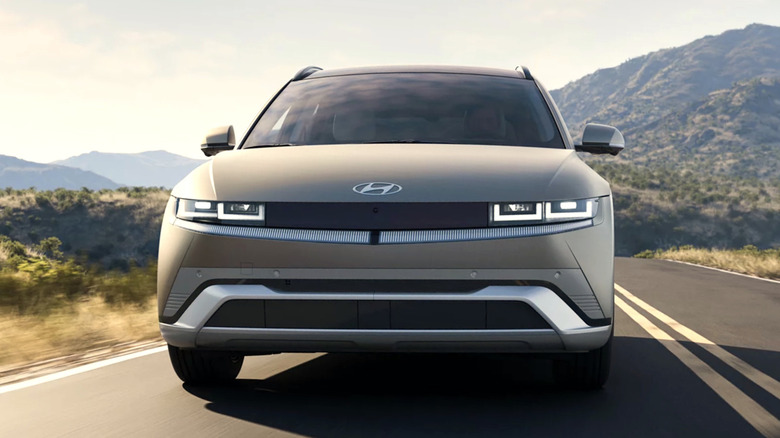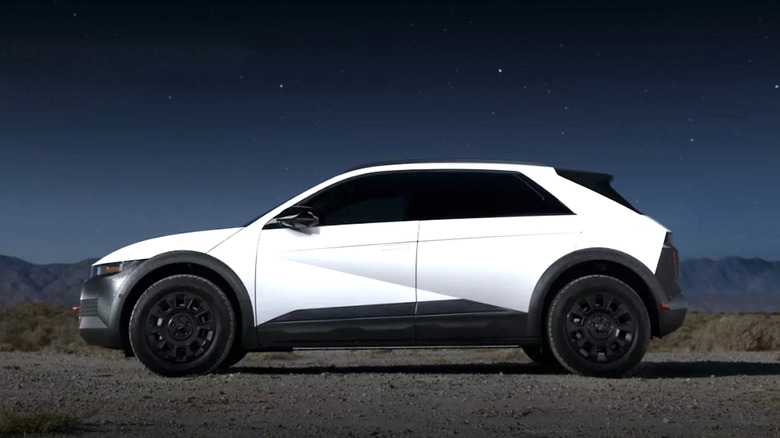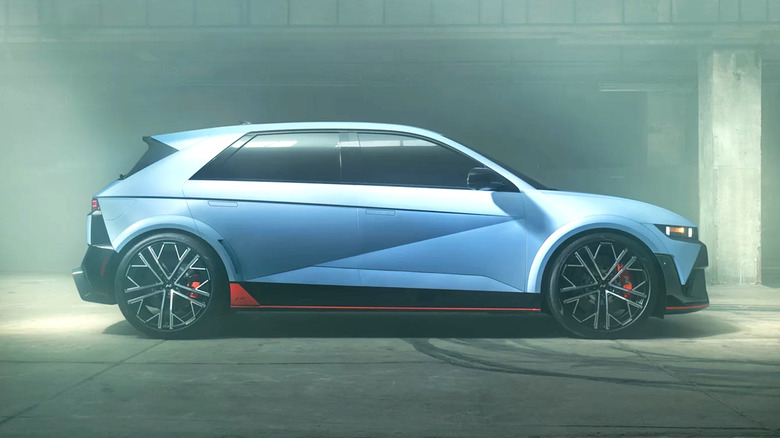Hyundai Ioniq 5 Vs 5 N: What's The Difference Between These EVs?
Over the past several years, Hyundai has become one of the more prominent players in the automotive market's EV movement. If you're unfamiliar with that term, EV stands for electric vehicle, with its Ioniq sub-brand being the face of Hyundai's all-electric offerings. If you're familiar with those offerings, you might know that the Ioniq 5 crossover SUV was, for all intents and purposes, its flagship vehicle, though the automaker had previously utilized the Ioniq nameplate on other makes.
The Ioniq 5 officially hit the streets in 2021. The make has proven quite popular since, with Hyundai devotees and many other drivers looking to join the EV-loving masses at the wheel of an Ioniq 5 or one of its many comparable alternatives. While Hyundai has yet to announce a legit generational upgrade for the build, it recently opened up production on an alternate make of the Ioniq 5, with the alt version bearing the additional letter designation of N.
Now, if one were to take a surface level look at the Ioniq 5 and 5 N side by side, you would likely struggle to tell the two vehicles apart. They are, after all, both Ioniq 5s. But once you have a butcher's look at what the models are offering, you'll find there are some pretty distinct differences. Here's a look at what sets the Ioniq 5 models apart from each other.
Hyundai Ioniq 5
We'll begin with the Ioniq 5, as it is the O.G. vehicle in Hyundai's all electric lineup. Just FYI — it's currently listed as one of many Hyundai models you can now purchase on Amazon. Ease of access aside, the 2025 Ioniq 5 is also one of the better reviewed electric vehicles on the market, earning better than average notes from the likes of Car and Driver and MotorTrend, among other outlets.
As for what those outlets like about the '25 Ioniq 5, the vehicle's stylish design and spacious interior are high on the list. Perhaps more important than those pluses is the vehicle's class-leading charging time, with the Ioniq 5 claiming its battery can charge from 10% to 80% in approximately 20-minutes. The vehicle is also outfitted with a NACS port, making it compatible with Tesla supercharger stations, and thus greatly improving access to charging on the fly. On a fully-charged power source, the vehicle offers an EPA-estimated range of 318 miles. The Ioniq 5 also packs some pretty legit punch under the hood, delivering up to 320 horsepower and 446 lb-ft of torque to drivers.
On the pricing front, Hyundai Ioniq 5 is not a break the bank sort of EV option, boasting a base-level MSRP of $42,600. Depending on the trim package you select, the overall cost could range up to the $60,000 range. However, the sticker price can also be reduced considerably via available credits and incentives that could total as much as $7,500 in rebates.
Hyundai Ioniq 5 N
Enter the 2025 Hyundai Ioniq 5 N, which recently earned the SlashGear Select badge from our in-house reviewer. While the N looks a lot like the original Ioniq 5, to call it an upgraded version of the base model would be an understatement. By most accounts, the all electric, all-wheel-drive Ioniq 5 N is an absolute beast in the power department, pumping the ponies up to a staggering 641 hp and a combined 568 lb-ft of torque. That combo delivers a reported zero-to-60 mph time of 3.0 seconds flat.
Such numbers deem the Ioniq 5 one of the most track-ready EVs on the planet, with Hyundai also dubbing the vehicle the most fun to drive of all its makes and models to date in promo materials. Our reviewer agreed, claiming the Ioniq 5 N may be "the first exciting EV to drive ever." On top of the power, such accolades are largely the result of a laundry list of performance-minded upgrades that the original Ioniq 5 could only aspire to.
All the power and handling does come at a cost, however, with the Ioniq 5 N's range dramatically lower than that of its counterpart, topping out at a slightly below average 221 miles. That range sacrifice is further hindered by the sticker price of a base-level Ioniq 5 N, which, at $66,200, is bumping up against luxury territory despite offering few luxury upgrades. Even if its charging time is on par with the Ioniq 5, that may test anyone's need for EV speed really is.


